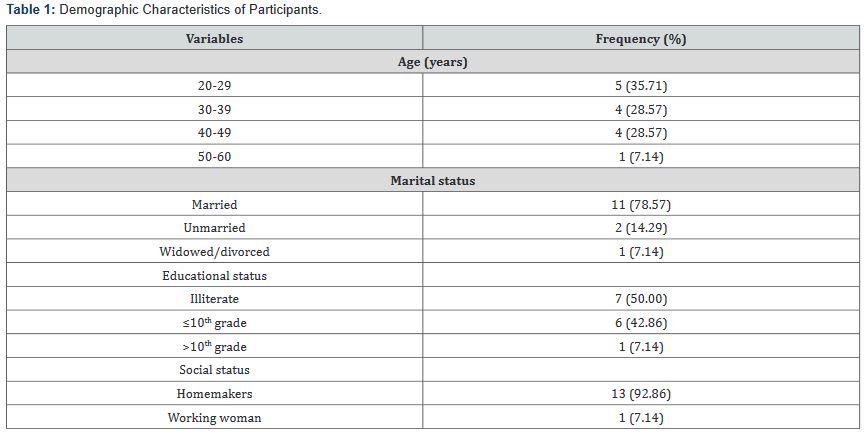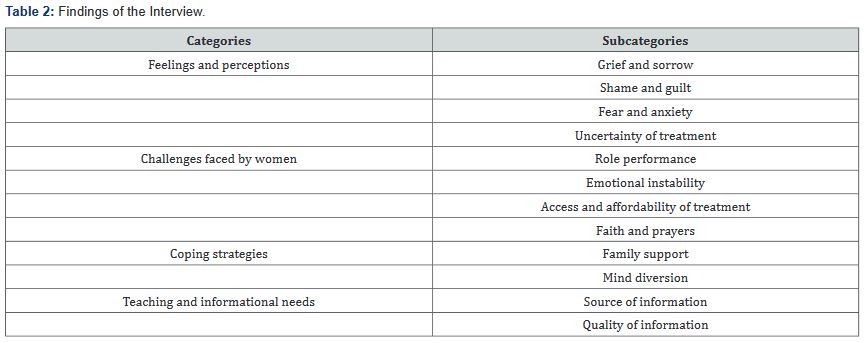Analysis of Depression and Anxiety Among Patients Undergoing Surgery for Breast Cancer
Muhammad Ahmad1*, Umar Sultan2 and Zohaib Liquat3
1Hussain Cardiology Associates, Pakistan
2Medical Officer at RHC Ghakhar Gujranwala, Pakistan
3Medical Officer at Niazi Teaching Hospital, Sargodha, Pakistan
Submission: December 26, 2018; Published: January 11, 2019
*Corresponding author: Muhammad Ahmad Hussain Cardiology Associates, Pakistan
How to cite this article: Muhammad Ahmad, Umar Sultan, Zohaib Liquat. Analysis of Depression and Anxiety Among Patients Undergoing Surgery for Breast Cancer. Glob J Oto, 2019; 19(1): 556003. DOI: 10.19080/GJO.2019.19.556003
Abstract
Introduction: Pakistan is a developing country where up to 70% of women present when breast cancer is in its advanced stage. Advanced breast cancer is cancer that is metastatic. Advanced breast cancer is a life threating disease with a poor prognosis profile. Women with a diagnosis of advanced breast cancer engage in a multi-stage cancer treatment cycle often involving surgery, radiation treatment and chemotherapy.
Aims and Objectives: The basic aim of the study is to analyze the sources of distress among patients undergoing surgery for breast cancer in Pakistan.
Material and Methods: This study was conducted at Niazi Teaching Hospital, Sargodha during Dec 2017 to May 2018. Using a purposive sampling strategy, 14 adult female breast cancer patients were selected for this study with variations in their age, educational level, socioeconomic status, and number of exposures to RT. Data were collected through the recording of the face-to-face in-depth interviews, using a semi-structured interview guide.
Results: A total of 14 female breast cancer patients participated in this study. Their age ranged between 20 and 60 years, with an average of 35 years. Majority (79%) of them were married. About 50% of them were illiterate, whereas 43% were matriculate. All of them were Muslims and of Pathan ethnicity. Before RT, all of them had mastectomy of the affected breast, followed by chemotherapy
Conclusion: It is concluded that a substantial number of adult cancer patients were depressed and have a suicidal ideation, causing a significant functional impairment.
Introduction
Pakistan is a developing country where up to 70% of women present when breast cancer is in its advanced stage. Advanced breast cancer is cancer that is metastatic. Advanced breast cancer is a life threating disease with a poor prognosis profile. Women with a diagnosis of advanced breast cancer engage in a multi-stage cancer treatment cycle often involving surgery, radiation treatment and chemotherapy. These cycles of treatment are not free of side effects. Women must face possible disfigurement, surgical pain, the side effects from chemotherapy which can include feelings of anger, frustration, fear, isolation, fatigue as well as burns from targeted radiotherapy [1]. Globally, breast cancer is the most common cancer among women, and a leading cause of cancer-related deaths in this gender. It accounts for 23% of all cancer cases worldwide. The incidence of breast cancer has been increasing rapidly in the developing countries. Among the Asian countries, Pakistan has the highest prevalence of breast cancer, where one in every nine women is at risk of developing breast cancer [2]. In western countries, breast cancer is prevalent among women aged 60 years and above, whereas, in Asian countries, including Pakistan, it occurs during the reproductive age between 30 and 50 years. Hence, women with breast cancer, in Pakistan, may face more challenges due to household and child-rearing responsibilities, as compared to those living in the western countries [3]. According to the American Society for Radiation Oncology, radiotherapy (RT) is a common treatment modality for cancer which is prescribed to about two-thirds of the cancer patients, either before or after surgery. In breast-conserving surgery, RT reduces the chances of recurrence as well as the risk of metastasis and death from breast cancer [4,5].
Aims and Objectives
The basic aim of the study is to analyze the sources of distress among patients undergoing surgery for breast cancer in Pakistan.
Material and Methods
This study was conducted at Niazi Teaching Hospital, Sargodha during Dec 2017 to May 2018. Using a purposive sampling strategy, 14 adult female breast cancer patients were selected for this study with variations in their age, educational level, socioeconomic status, and number of exposures to RT. Data were collected through the recording of the face-to-face in-depth interviews, using a semi-structured interview guide.
Statistical Analysis
Student’s t-test was performed to evaluate the differences in roughness between group P and S. Two-way ANOVA was performed to study the contributions. A chi-square test was used to examine the difference in the distribution of the fracture modes (SPSS 19.0 for Windows, SPSS Inc., USA).
Results
total of 14 female breast cancer patients participated in this study. Their age ranged between 20 and 60 years, with an average of 35 years. Majority (79%) of them were married. About 50% of them were illiterate, whereas 43% were matriculate. All of them were Muslims and of Pathan ethnicity. Before RT, all of them had mastectomy of the affected breast, followed by chemotherapy. Analysis of the interviews data each category and its subcategories are described below with some excerpts from the participants’ narratives (Tables 1 & 2).


Discussion
Breast cancer is second most prevalent type of cancer and is equally common in developing as well as developed countries. The treatment expenditure of breast cancer is a burden not only for people diagnosed with cancer but also for their families and society as a whole. According to American Cancer Society (2010) breast cancer is one of the top three types of cancer that caused the most economic impact ($88 billion) [6]. Though successful treatment options are available to deal with breast cancer, pain and suffering associated with available treatment modalities is significant. Chronic, persistent pain acts as an additional stressor for a person already suffering from many psychological, social and medical stressors [7].
Research has demonstrated association between clinically relevant pain and breast cancer surgery in 10-50% patients. There are pathogenic mechanisms involved in breast cancer like nerve damage and certain sensory disturbances (e.g., burning and sensory loss) are part of side effects of surgical processes [8]. Breast cancer surgery is followed by chronic neuropathic pain syndrome like Phantom breast pain (a sensory experience that is present even after removal of breast and is painful), Inter costo brachial Neuralgia (pain in the distribution of inter costo brachial nerve) and Neuroma pain (pain in the region of scar on breast, chest or arm). Radical mastectomy is most disfiguring type of breast cancer surgery and it involves removal of breast, major and minor chest muscles, and lymph nodes [9]. Breast conserving techniques, another treatment option, were expected to reduce psychiatric morbidity and sexual dysfunction, but none of the studies involving appropriate assessment of psychiatric morbidity showed any advantage of breast conserving therapy [10].
Conclusion
It is concluded that a substantial number of adult cancer patients were depressed and have a suicidal ideation, causing a significant functional impairment. This study clearly demonstrated a significant association between pain complaint and depression among adult cancer patients.
References
- Halkett GK, Kristjanson LJ, Lobb EA (2008) If we get too close to your bones, they’ll go brittle: Women’s initial fears about radiotherapy for early breast cancer. Psychooncology 17: 877-884.
- Hendry JA (2011) A qualitative focus group study to explore the information, support and communication needs of women receiving adjuvant radiotherapy for primary breast cancer. J Radiother Pract 10(2): 103-115.
- Lee TS, Kilbreath SL, Refshauge KM, Pendlebury SC, Beith JM, et al. (2008) Quality of life of women treated with radiotherapy for breast cancer. Support Care Cancer 16(4): 399-405.
- Sherminie G, Cottrell J (2014) Experiences of breast cancer patients undergoing radiation therapy in Sri Lanka. Radiat Ther 23(1): 101- 104.
- Webber K, Mok K, Bennett B, Lloyd AR, Friedlander M, et al. (2011) If I am in the mood, I enjoy it: An exploration of cancer-related fatigue and sexual functioning in women with breast cancer. Oncologist 16: 1333-1344.
- Wong JJ, D Alimonte L, Angus J, Paszat L, Soren B, et al. (2011) What do older patients with early breast cancer want to know while undergoing adjuvant radiotherapy? J Cancer Educ 26(2): 254-261.
- Poirier P (2011) The impact of fatigue on role functioning during radiation therapy. Oncol Nurs Forum 38(4): 457-465.
- (2001) Fatigue in patients with cancers of the breast or prostate undergoing radical radiotherapy. J Pain Symptom Manage 22: 1007- 1015.
- Stiegelis HE, Ranchor AV, Sanderman R (2004) Psychological functioning in cancer patients treated with radiotherapy. Patient Educ Couns 52(2): 131-141.
- Schnur JB, Ouellette SC, Bovbjerg DH, Montgomery GH (2009) Breast cancer patients’ experience of external-beam radiotherapy. Qual Health Res 19(5): 668-676.





























